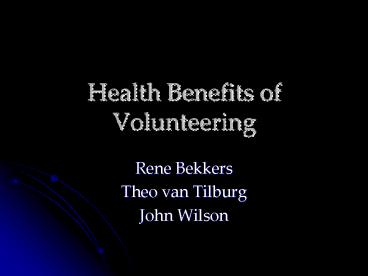Health Benefits of Volunteering - PowerPoint PPT Presentation
1 / 22
Title: Health Benefits of Volunteering
1
Health Benefits of Volunteering
- Rene Bekkers
- Theo van Tilburg
- John Wilson
2
Benefits of volunteering
- In Clary Snyders Volunteer Function Inventory,
volunteering serves many functions, e.g. value
expression, social contacts, learning,
enhancement - These functions may be the benefits that
volunteers anticipate and hence motivate
volunteering - Health benefits are not included in the VFI but
are important nonetheless
3
Health benefits
- A large and still growing body of literature
suggests that volunteering enhances or sustains
health, especially in old age - Volunteers are more likely to report they are in
good health, report fewer chronic illnesses, and
better mental health - Volunteers live longer than non-volunteers
4
Issues to be resolved
- What kind of volunteering is most beneficial?
- What kind of health outcomes are affected by
volunteering? - How and why does volunteering promote health?
- How much of the relationship is causal?
5
Strictly speaking
- We do not know to what extent volunteering
benefits health, and to what extent health
benefits volunteering - Its impossible to tell from cross-sectional
relationships - To what extent do more healthy individuals
self-select into volunteering? - To what extent do changes in health affect
changes in volunteering and vice versa?
6
Three arguments
- Joy of giving hypothesis Volunteering has a
physiological stress-buffering effect - Social network size hypothesis Volunteering
builds networks that may be called upon when in
need oneself - Personality strength hypothesis Volunteering
enhances psychological well-being that sustains
health
7
The joy of giving
- It is better to give than to receive
- Among a sample of US couples, a larger amount of
support given (but not received) was associated
with better health outcomes (Brown et al., 2003) - Among a sample of Finnish women, a larger amount
of support given (relative to received) was
associated with lower depression (Väänänen et
al., 2005) - But not among men (reverse pattern)
- And perceived benefits for others do not seem to
moderate the effect (Morrow-Howell et al., 2003)
8
Social networks
- Protect health because of
- Access to health information
- Normative control, reducing unhealthy living
- Support received when in need
- In sum, individuals with larger networks enjoy
better health (House, 1985) - But isnt this all simply the result of more
healthy individuals having larger networks?
9
Personality strength
- Volunteering increases personal coping resources
such as self-esteem, an internal locus of
control, self-efficacy, sense of mastery - This cluster of traits called personality
strength positively affects health - Positive beliefs speed up recovery after surgery
(Scheier et al., 1989) - But isnt this all about more healthy individuals
(justly) feeling they are more in control of
their lives?
10
Adequate Testing, Please!
- Cross-sectional data are useless here
- We need longitudinal data to disentangle causes
and consequences of volunteering - We should look at how people change over time
when they have started and quit volunteering - Halaby (2004, Annual Review of Sociology)
controlling for Yt-1 is not enough - Use fixed effects regression models, eliminating
variance between individuals - XT in STATA
11
Longitudinal Ageing Study Amsterdam (LASA)
- Ongoing panel study among a random sample of the
(55) elderly in the Netherlands - Baseline study in 1992-1993 collected elaborate
information on objective and subjective health
status, religion, personality, socio-economic
status, social networks and engagement in
voluntary associations - Respondents have been re-interviewed every three
years unless unable or dead
12
Development of subjective health
13
Mortality risks
14
Volunteering effects on subjective health
Estimates on effects of volunteering (m26.5)
from random and fixed effects regression models.
Source LASA, 1992-2003 (n9,034 2,370
unbalanced panel)
15
Volunteering effects on personality strength
16
Volunteering effects on health outcomes
17
Volunteering effects on networks
18
Stepwise analysis subjective health
19
Stepwise analysis mortality risk
Note waves 1-4 only
20
Volunteering effects
- Social network size Volunteering enlarges
networks, but not as strong as it seems - Joy of giving Volunteering does not increase
support given or received, emotional or
instrumental - Personality strength Volunteering improves
personality strength (mastery)
21
Volunteering effects are mediated
- NOT by social network size because changes
therein are not related to health - By the joy of giving
- instrumental support given sustains health and
instrumental support received is detrimental - but emotional support received delays death and
support given speeds it - By personality strength Volunteering effects on
subjective health are mainly mediated by
personality strength
22
Discussion
- Are other social activities less beneficial than
volunteering? - How does the health benefit vary with levels of
engagement (number of hours volunteered)? - Which variables moderate the health benefit (age,
religion, education)?































